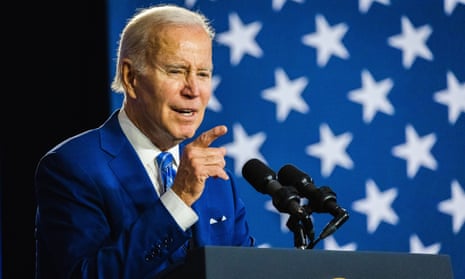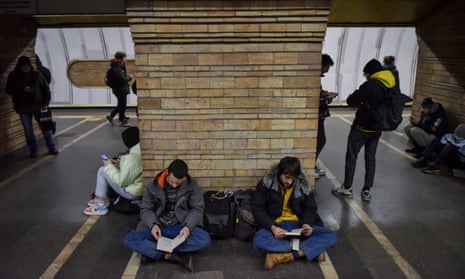International Monetary Fund staff will meet with Ukrainian officials in Warsaw next week, a source familiar with the plans has said, as Ukraine presses for a multibillion-dollar borrowing program to cover its funding needs amid the war with Russia.
Reuters reports that global ratings agency Moody’s on Friday downgraded Ukraine’s sovereign rating to Ca as it expects the war with Russia to create long-lasting challenges for the country. Moody’s website said the rating meant debt obligations were “likely in, or very near, default”.
Half of Russia’s main battle tanks have likely been destroyed in combat or captured by Ukraine, a senior US defence official has said.
Celeste Wallander, assistant defence secretary for international security affairs, made the comments on Friday at a virtual event at the Centre for a New American Security thinktank.
Agence France-Presse also reported that Wallander did not provide an exact figure for the number of tanks lost since Russia invaded last February but her estimate comes as Ukraine is set to receive an influx of heavy western tanks from its supporters.
Britain has said its Challenger 2 tanks will be deployed in Ukraine in March, while Germany and its allies aim to get a battalion of Leopard 2 tanks to Kyiv by April.
The US has also promised a battalion – or 31 – of its M1 Abrams tanks, but they are expected to take significantly longer to arrive.

Joe Biden will use his trip to Poland this month to rally allies while aiming to sustain the coalition that has supported Ukraine defences since Russia’s invasion a year ago, Associated Press reports.
The US president’s visit, set for 20-22 February, comes as polling in the US and abroad suggests support is waning for maintaining tens of billions of dollars worth of assistance for Ukraine in the war. In addition, Republicans who recently took control of the House of Representatives have voiced scepticism – or outright opposition – to continuing the funding.
Russia, meanwhile, is believed to be planning a renewed offensive in conjunction with the anniversary, and has stepped up its long-range attacks on Ukraine’s military and civilian infrastructure in recent weeks.
The White House press secretary, Karine Jean-Pierre, said Biden would meet with the Polish president, Andrzej Duda, and the leaders of the Bucharest Nine – Nato allies in Eastern Europe – to discuss his “unwavering support” for the alliance.
It remained unclear whether Biden would try to visit Ukraine, as many other western leaders and members of Congress have done.

Biden visited Poland weeks after the war began in February, delivering a forceful case for supporting Ukraine’s defence in front of Warsaw’s iconic Royal Castle. The US first lady, Jill Biden, briefly crossed the border on a trip in May and met her counterpart, Ukrainian first lady Olena Zelenska.
Biden and White House officials have highlighted the unique security challenges raised by a potential visit by a US president to a country under invasion by nuclear-armed Russia.
Hello, I’m Adam Fulton and I’ll be bringing you the latest developments in the Russia-Ukraine war.
Russia bombarded Ukraine in a large-scale attack on Friday, hitting several cities including Kyiv, the capital. Ukraine said Russian forces fired more than 100 missiles throughout the country and carried out 12 air and 20 shelling attacks, and that Ukraine shot down 61 missiles.
Kyiv said Russia struck power facilities in six regions, causing blackouts across most of Ukraine.
The attacks came a day after Ukraine president Volodymyr Zelenskiy ended a tour of European allies to lobby leaders for long-range weapons and fighter jets. Zelenskiy said: “London, Paris, Brussels – everywhere I spoke these past few days about how to strengthen our soldiers … We received good signals.”
In other developments as it approaches 9am in Kyiv:
US president Joe Biden announced he would mark one year since Russia’s invasion by visiting Poland, Ukraine’s neighbour and Nato ally, on 20-22 February. “The president will make it very clear that the United States will continue to stand with Ukraine for as long as it takes,” said John Kirby, a spokesperson for the White House national security council.
Two Russian cruise missiles entered the airspace of Moldova and Romania, Ukraine said. Gen Valerii Zaluzhnyi, commander-in-chief of Ukraine’s armed forces, said the Kalibr rockets crossed into Moldova at 10.18am local time on Friday. They then flew into Romania at 10.33am at the intersection of the state border before recrossing into western Ukraine, he said.
Moldova confirmed at least one missile had overflown its airspace and summoned the Russian ambassador over the incident. It is not the first time Russia has sent its missiles into Moldova, with the conflict in danger of spilling out across the region. On Friday, Moldova’s pro-EU government resigned, adding to the sense of crisis.
Romania’s foreign ministry categorically denied an incursion occurred. It said the Russian cruise missiles came to within 35km (22 miles) of the country’s north-eastern border but did not violate its territory.
The US has “no indication” of a direct military threat by Russia to Moldova or Romania at this time, US state department spokesperson Vedant Patel said. “We maintain close contact and communication with our Moldovan partners and Romanian allies.”
Kyiv’s mayor, Vitali Klitschko, said 10 Russian missiles had been shot down over the capital in Russia’s wave of attacks and that sirens blared during the Friday morning rush hour, with weary civilians taking shelter. It was the first attack on the capital in two weeks.

Ukraine has officially asked the Netherlands for F-16 fighter jets, its air force has said. The Dutch defence minister, Kajsa Ollongren, confirmed the request, saying: “We need to discuss the availability of the F-16 with the Americans and other allies.”
Any decision to supply fighter jets to Ukraine must come from Nato, Poland’s prime minister said. Mateusz Morawiecki said “some countries” at an EU summit in Brussels did not agree with his proposals about deliveries of ammunition to Kyiv. He added that Poland was “not excluding” closing further border crossings with Belarus, citing “growing tensions”.
Russia has launched a major offensive in eastern Ukraine and is trying to break through defences near the town of Kreminna, the governor for the Luhansk region said on Thursday. Serhiy Haidai said Russian troops had gone on the attack and were trying to advance westwards across a winter landscape of snow and forests. There had been “maximum escalation” and a big increase in shooting and shelling, he said.
A group of 35 countries will demand that Russian and Belarusian athletes are banned from the 2024 Paris Olympics, according to Lithuania’s sports minister, Jurgita Šiugždinienė. The International Olympic Committee recently moved away from having an outright ban on athletes from Russia and Belarus and is investigating ways they can qualify for the Olympics under a neutral flag.
Marina Ovsyannikova, the former Russian state TV editor who interrupted a live news broadcast to protest against the start of the Ukraine war, has described her “chaotic” escape from house arrest in Moscow and how she fled across Europe to seek asylum in France.
With contributions from Reuters and Agence France-Presse

 1 year ago
138
1 year ago
138










 English (US)
English (US)